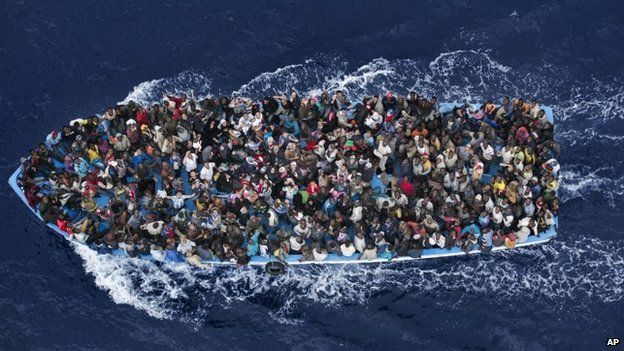EU seeks solutions to its Mediterranean crisis
- Published
- comments

Europe starts smiling around this time of year.
Spring is round the corner. The first buds appear, birds twitter loudly and along boulevards and in little squares across the continent, brave cafe owners begin to put tables and chairs outside.
But it's not all about sunshine.
Spring also heralds something darker and far more ominous for Europe.
Men, women and children screaming, praying and, appallingly, many dying, in clapped out old boats.
Waves and waves of migrants sent across the Mediterranean by smugglers, who are so keen to squeeze the last cent out of the desperate that not even children are offered life jackets.
The reason why? A life vest is chunky. It uses up boat space where another paying migrant can be shoe-horned in instead.
About 3,500 people died last year trying to reach Europe by sea, mainly from the Middle East, with 200,000 surviving the journey.
Some NGOs reckon this year that figure could even reach a million.
Perfect fodder for the anti-immigration and right-wing parties gaining power in many European countries.
Which in itself is a reason why so many governments in the EU shy away from talk of a common immigration policy.
But the European Commission wants to change all that. It will formally present its ideas in May.
One of them is already the talk of the town.
That is, to use EU offices and embassies in non-EU transit countries, like Niger, Turkey and Egypt, to process asylum applications before migrants reach European soil.
Those granted asylum or refugee status would be divided up among EU countries. Anyone else would be turned away.
There would then of course need to be agreement on common grounds for asylum among all EU states.
The proposal is still rough round the edges but, not surprisingly, Italy is a huge supporter of the idea and wants to discuss it at Thursday's meeting of EU interior ministers in Brussels.
Thousands of migrant boats appear in Italian waters.
Under current EU regulations, the country irregular migrants arrive in is responsible for processing and documenting them, which includes feeding, clothing, housing and giving medical treatment as well as the paper work.
The southern countries of Europe's soft underbelly - Italy, Spain, Greece - have been hard-pushed to cope. Italy has been accused of allowing thousands of illegal arrivals to "disappear" undocumented.
And who is responsible for rescuing desperate migrants at sea?
This is currently an ugly finger-pointing exercise.
Italy looks to the EU, while EU countries have said it is Italy's problem.
They refused to co-fund Italy's costly Mare Nostrum search and rescue programme on the grounds that, according to the UK, for example, it just encourages others to make the same journey.
But families fleeing conflict and persecution probably don't check the quality of maritime patrols.
Replacing Mare Nostrum with a scaled-down EU frontier force doesn't seem to have put many migrants off.
NGO figures show the number of people arriving this January is 50% up on the same time last year.
The debate is complex and extremely emotive. Few question that this is an ongoing humanitarian crisis.
This spring, can Europe come up with a political solution? And who will foot the bill?
- Published9 March 2015
- Published9 March 2015
- Published15 July 2014
- Published15 July 2014